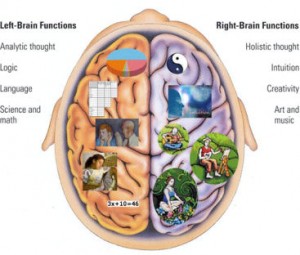If you're new here, you may want to subscribe to my RSS feed. Thanks for visiting! 
Could it be possible that leadership alignment is a great goal to aspire towards but one that is probably very difficult to attain? Think about it. Let’s say that the CEO is surrounded by a team of 7 executive leaders. The absolute ideal would be that they all feel a great sense of common purpose, that they all agree on the best way to achieve this, that they all speak to their teams and departments with one voice, that they all promote one vision and that they are all great role models of one set of company values. Continue reading Is Leadership Alignment Really Possible?

How do you feel about the topic of the left brain-right brain and its benefit to the performance of leaders and teams? Here is why I am asking. It seems to me that this extremely effective concept, that has enhanced the performance of leaders and teams around the world, is seriously misunderstood. Some leaders believe that it is a psychological concept; others believe that it is too soft and fluffy; and others have called it esoteric. Continue reading Left-Brain.. Right Brain Thinker..Which are You?
The Leadership Mystery of 2010
 I have joined several excellent Leadership Groups in Linkedin and it has been a fascinating journey for me. Reading the questions and comments of others, as well as the responses to my comments, what has ‘hit me on the side of the head’ is that although there are some truly well articulated ideas about what leadership is – there is absolutely nothing new! Great authors like Hamel and Prahalad, Peter Senge, Rowan Gibson, Kouzes and Posner, Stephen Covey and Jim Collins, amongst many others, have said everything we are saying in these online groups today. I have joined several excellent Leadership Groups in Linkedin and it has been a fascinating journey for me. Reading the questions and comments of others, as well as the responses to my comments, what has ‘hit me on the side of the head’ is that although there are some truly well articulated ideas about what leadership is – there is absolutely nothing new! Great authors like Hamel and Prahalad, Peter Senge, Rowan Gibson, Kouzes and Posner, Stephen Covey and Jim Collins, amongst many others, have said everything we are saying in these online groups today.
Nothing new? So What Does That Mean?
And yet, every one of us, including myself, who keep the conversation going, thinks we see the light. Each one of us thinks we have a new pearl of wisdom that can enlighten others about what leadership really is. But truth be told, none of us have come up with anything that is radically different. Don’t get me wrong about these groups. I know that people are posing critical questions and the collective dialogue is causing some of us to re-frame our previous notions about leadership. I have learned a great deal from participating in these groups. Still I am struck by the fact that the leadership groups are now examining what it takes to be a true leader, because of the fact that this is a radically changing environment. Yet, with all these bright minds we have not come up with anything radically new, in fact we are falling back into comfort zones.
Ground Zero
 This astonishes me because I think that as a result of everything that has happened in the past year, it is critical for us to realize that we are at ground zero on the issue of leadership. And ground zero always requires a transformed approach, not a tweaking of the old approaches. This astonishes me because I think that as a result of everything that has happened in the past year, it is critical for us to realize that we are at ground zero on the issue of leadership. And ground zero always requires a transformed approach, not a tweaking of the old approaches.
I have always thought that in times of declining growth we need to go beyond our comfort zones and seek a new way that addresses the new realities. I would think that this is a time for us to go beyond what we already know and find a way to discover what we don’t know.
I am confused – as you may have noticed – and would love your thoughts about this:
- What are your beliefs about the idea that the basics of great leadership do not change, irrespective of a radically changed environment?
- If you believe we need to rethink leadership, how do we get past our traditional ingrained ideas?
I happen to think that the new way is Spirited Economics™, an approach where leaders use employee spirit as a quantifiable financial asset. What do you see new about this?


The Spirit and Pain of Africa
The Differences Are Amazing
So here I am visiting family in Johannesburg, South Africa. The contrast between Dallas, Texas, where I now live, and Johannesburg as it is today, is incredible. Let’s start with the way people live. People in Johannesburg are prisoners in their own homes. High brick walls surround every home and on the top of these walls there is electrified wiring. In addition to the regular burglar alarm system in each home, every community hires a security company that uses armed mercenaries, wearing bullet proof vests, to patrol the community, for which the home-owners pay a monthly fee. It is inadvisable to rely in the police for any help because they are inept and corrupt.
A large number of the millions of unemployed have turned to crime in order to feed themselves and their families, so this means that you have to be very vigilant at all times. The first thing you do when you get into your car is lock all the doors, close the windows and be sure to hide your purse from view because this would be inviting a possible attack. Returning home and driving into the garage requires special vigilance. Criminals often watch and wait for people to drive up to their garages and then sneak in as the garage door opens. So before you open the garage you look to the left and the right checking for possible hidden attackers; and then you close the garage door behind you as quickly as possible.
The roads here are not maintained. There are potholes everywhere. It is very easy to puncture your tire if you are not quick enough to avoid the gashes in the road. Then there are beggars literally at every light, each flaunting some terrible physical deformity. After watching Slumdog Millionaire, I wonder how many of those with blind holes on their faces and deformed limbs were deliberately mutilated so that they could earn more as beggars?
The average life expectancy is 50 years because of Aids and there are thousands upon thousands of orphaned children whose parents have died of Aids related diseases. In the past year alone, 750,000 people died of Aids.
The Spirit in Johannesburg
This having been said, Johannesburg has a spirit and a magic all its own. Those who do not do crime are involved in entrepreneurial street activities, selling all kinds of goods hoping to eke out enough money to put food on the table that evening. And despite their terrible hardships they are cheerful and interactive, laughing and singing. One sign held by a beggar caught my eye. It said, ‘I do not want to do crime. Please help me feed my family.’
Being in Johannesburg and visiting with friends and family is like living in two worlds. There are the scary scenes you see when you go out of the high walls into the city and then there is life going on in a totally normal way, with people going to work, fetching the kids from school, visiting with friends, sitting at sidewalk cafes, working and playing, seemingly immune to this scary other world, accepting it as the way things are.
So when you read this, think about how blessed you are being able to live a life without having to look over your shoulder every moment of every day, fearful of the high possibility of becoming yet another victim of crime.

Corporate Leaders Like the Way They Lead
 I read a really thought provoking article this week in the Harvard Business Publishing website, Is the Tata Nano Really “The People’s Car”? written by Scott Anthony. He speaks about the possibility that the Tata Nano – the so-called people’s car in India that will be priced as low as $2000, may possibly turn out to be a flop. And if this happens it would be because the product may have been created without looking at the world through the consumer’s eyes. As the article says, we would think that those families who are precariously perched on a scooter, zooming dangerously in between cars, will surely flock to an affordable car that projects social status and provides a safe, comfortable ride? It appears, however, that they could already get a reasonable used car for the price of a Nano. And they choose not to. I read a really thought provoking article this week in the Harvard Business Publishing website, Is the Tata Nano Really “The People’s Car”? written by Scott Anthony. He speaks about the possibility that the Tata Nano – the so-called people’s car in India that will be priced as low as $2000, may possibly turn out to be a flop. And if this happens it would be because the product may have been created without looking at the world through the consumer’s eyes. As the article says, we would think that those families who are precariously perched on a scooter, zooming dangerously in between cars, will surely flock to an affordable car that projects social status and provides a safe, comfortable ride? It appears, however, that they could already get a reasonable used car for the price of a Nano. And they choose not to.
The article goes on to say that ‘anyone who has driven in India knows there is a remarkable efficiency on her chaotic streets. Every square inch of road gets used as scooters sneak in between gaps between cars. It maximizes people per square mile in a way that boxy automobiles never could. Turning all of those scooters into Nanos would create a traffic nightmare.’
This got me thinking about leadership development specialists, like myself. It would seem, from speaking to many talented people who offer leadership development, that convincing leaders that they could possibly enhance profits by upgrading and revisiting their leadership skills, is a hard sale. The majority don’t truly want it. So perhaps we are not listening to our consumer?
Perhaps if we looked at the world through the eyes of corporate leaders we would see that they like the way things are; they like the way they lead even though it creates crises and chaos and even though there may be a better way.
So this raises the question – if leaders prefer to precariously zoom from one leadership-created crisis to another, what is it about leadership development specialists that makes us so passionate about wanting to convince them to try another approach? Perhaps we need to listen to our customer and really hear them. With some exceptions, they seem to be telling us that they like the way they lead… and when they don’t they will call us.
But let’s go back to the Tato Nano. The story is even more fascinating. Tata Sons President and Chairman, Ratan Tata, boldly proclaimed his intent to build the people’s car more than five years ago. That pronouncement captured the attention of other automobile executives, some of whom began busily planning their own low-priced automobiles. Carlos Ghosn from Renault, for example, announced this week that his company plans to introduce a car that will be even cheaper than the Nano.
Time will tell as to whether the strategy of the Tato Nano will be a huge success or not.
And time will tell whether leaders ever truly embrace leadership development or not.
Are you ready to make that necessary change? If so, please contact me to discuss this further.
I recommend that you download my free eBook also. “Using the Power of a Vision to MOve Your Company Through the Recession”
|
|






 I read a really thought provoking article this week in the Harvard Business Publishing website,
I read a really thought provoking article this week in the Harvard Business Publishing website, 

